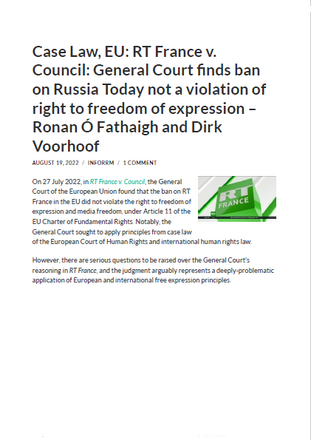
In early March 2022, RT France lodged an appeal to the General Court challenging the decision of the Council of the EU which had banished RT production across EU members. A few days earlier, by adopting a Decision and a Regulation, the Council had employed a double legislative tool aiming at banning RT France broadcasting in response to the Russian invasion of Ukraine.
In July 2022, the ruling of the Court argued that the ban imposed on RT France did not violate the right to freedom of expression and media freedom of the EU Charter of Fundamental Rights.
By analysing the ruling of the General Court, Ronan Ó Fathaigh and Dirk Voorhoof draw attention to a number of critical reasonings which they identified as challenging the freedom of expression and information:
- In the context of the relevant case law of the European Court of Human Rights, the General Court heavily relies on an individual case NIT S.R.L. v. the Republic of Moldova. However, while in the NIT S.R.L. case the decision to revoke the licence was taken by a specialised independent body, in RT France the ban was imposed by the Council, which is political, non-independent, and non-specialist.
- According to the authors, the discretion enjoyed by the Council in operating a prior restraint fails to provide procedural guarantees.
- The authors argue that while the Court relies on Article 20(1) of the International Covenant on Civil and Political Rights, proclaiming that “Any propaganda for war shall be prohibited by law”, it refrains from engaging with Article 19 of the same treaty. According to Article 19, broadcasting may be subjected to restrictions provided that such limitations are imposed by a court of law.
- The authors explain that while the Council's main argument for the ban relies on RT France's “propaganda actions”, the EU legislative body does not provide any definition or provision on “propaganda”.
- Ronan Ó Fathaigh and Dirk Voorhoof draw attention to the Court’s argument referring to the threat posed by RT France to the EU public order and security. According to the two scholars, such a claim does not have a solid legal basis.
- While the Court held that the ban would not entail the suppression of the right to freedom of expression, indicating that RT France journalists could still conduct interviews and research and disseminate their content outside of the EU, the authors warn that such restriction curtails freedom of expression “in its very essence”.
- Finally, the two authors find problematic the fact that the Court has been stressing the temporary character of the broadcasting prohibition, while both the Council’s decision and regulation had indicated that the ban will be kept in place until “the aggression against Ukraine is put to an end”.
The authors finally condemn in the strongest way the military aggression by the Russian State against Ukraine. Their comments should not be interpreted as giving any support to the Russian state media concerned. The concerns expressed in their blog focus on the one-sided approach, and arguably flawed application, by the General Court of the right to freedom of expression, and its selective application of ECtHR case law on Article 10 ECHR.
Tags: France Censorship Propaganda Freedom of expression Court of justice of the EU
